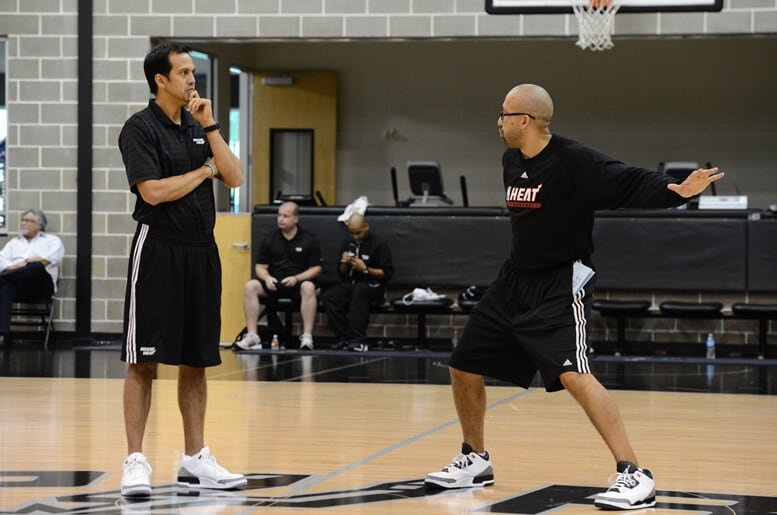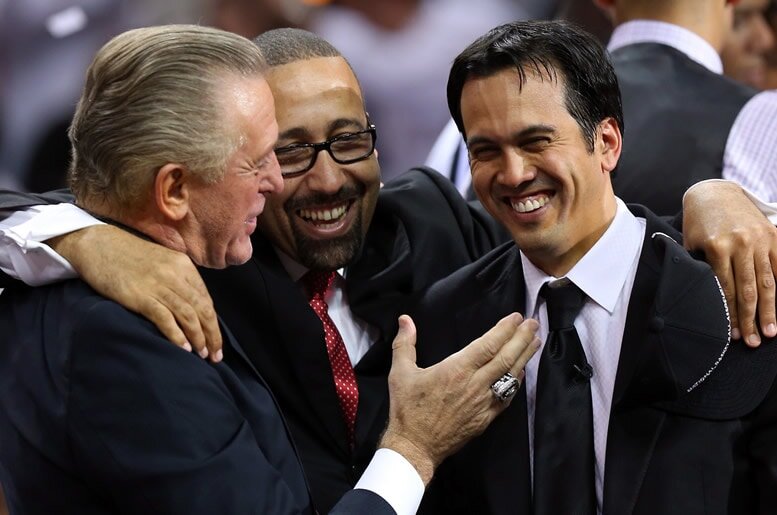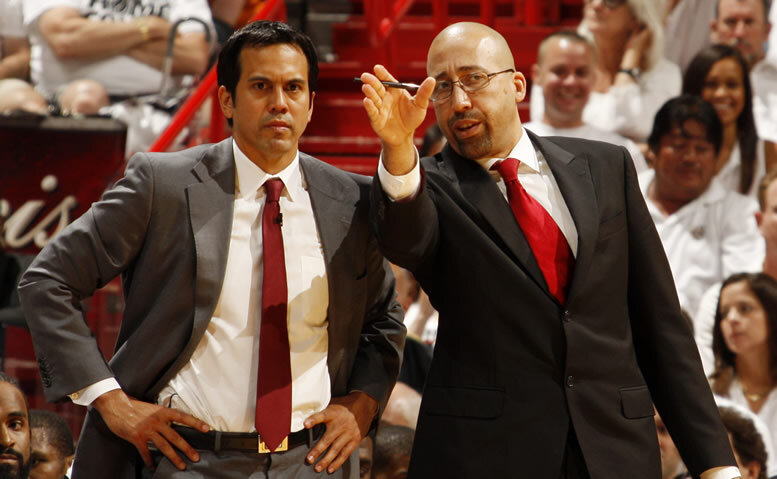By Michael Wallace
Grind City Media
MEMPHIS – The sting from a Game 7 loss in Toronto still burned the morning after when Miami Heat coach Erik Spoelstra felt the buzz from his ringing cell phone.
On the other end of the line that Monday morning in mid-May was Heat assistant David Fizdale.
“It was (freaking) depressing because we had just lost, and I was getting my mind ready for exit interviews with our players,” Spoelstra recalled. “And in the midst of that depression, at some point early that morning, Fiz calls me and says, ‘Spo, this is on. They want me to come up and interview.’ And I was like, ‘Alright, let’s go. Let’s activate.’ And just like that, we snapped out of what I was dealing with.”
What transpired in the following 24 hours would define the depths of a friendship that’s 20 years in the making. It would explain how a career-altering opportunity that separated them only reinforced a brotherhood bond that will connect them forever. When the Heat visit FedExForum for Friday’s game against the Grizzlies (10-5), it will mark the first time Fizdale will face his best friend and mentor as a head coach since he left Spoelstra’s side after eight years as his top assistant in Miami.
The back-to-back set between the teams wraps up Saturday when the Grizzlies visit Miami’s AmericanAirlines Arena, where Fizdale and Spoelstra were at the helm of Heat teams that advanced to four straight Finals from 2010 through 2014 and won consecutive NBA titles with catalysts LeBron James, Dwyane Wade and Chris Bosh. Fittingly, the Fizdale-Spoelstra reunion takes place over Thanksgiving weekend and at a time when the understudy has steered his team from a rocky start and onto a six-game winning streak that has positioned Memphis among the top contenders in the West.
“Everyone invested in my preparation for this,” Fizdale said of stepping into his first job as a head coach. “I leaned on the people who have always been honest with me. And they said this was a great window in Memphis and would give me a chance to take a good shot at it. I felt their foot at my back. We had our whole crew working on it because they knew how much I wanted an opportunity to do this.”
The Heat are in the midst of an unexpected rebuilding process, largely due to a string of devastating departures many in the organization didn’t see coming. LeBron stunned the Heat two years ago when he opted out of a six-year contract after four seasons and bolted back to Cleveland. Last summer, stalled contract negotiations with the most prolific player in franchise history resulted in Wade leaving the only team he’d ever played with to join the Bulls in arguably free agency’s biggest stunner. And although he technically remains on the Miami roster, Bosh and the Heat have essentially parted ways after a failed physical exam in September amid recurring problems from blood clots the previous two seasons.
Fizdale’s exit, however, was the culmination of preparation, perseverance, patience and just about everyone in the organization pulling together to push his career forward. It was a graduation of sorts. And it was highlighted by an all-night session that started May 16, the moment Fizdale called Spoelstra to inform him that the Grizzlies had scheduled his job interview the following day.

Here’s how it all unfolded from the moment Spoelstra hung up the phone.
“I got off the phone with Fiz and immediately called our guys in the video room at the arena and said, ‘Hey, rent a suite, put the boards up, get the screens, grab the iPads and get all the film you can,’” Spoelstra said. “I said, ‘Get the Memphis roster and every stat we can on them, and let’s go to work.’ That’s the least we could do. But that’s kind of the culture we built. We do whatever we can to help the next guy, and enjoy their success. It’s more than just about us. It was for Fiz, but we all felt part of it.”
With about 36 hours to spare before Fizdale was due in Memphis to interview, Spoelstra and his staff had turned a suite at the Ritz-Carlton Hotel in Miami into a war room similar to what teams use on draft nights. Spoelstra had no problem securing the room on short notice because he lived at the time in the resort hotel’s connecting residential tower.
The Heat routinely used this same bunker mentality approach when Spoelstra felt it necessary to get away from the familiar office setting in the arena and close ranks behind locked doors. In the past, this strategy had been used in the recruiting of the Big 3 to Miami and also to get through brutal playoff series against the Boston Celtics, Indiana Pacers and San Antonio Spurs.
This time, it was all-hands-on-deck to shore up Fizdale’s presentation for the Grizzlies’ brass.
“I study the NBA and teams, so I had a good feel for this Memphis team going into it,” Fizdale reflected. “Whatever I didn’t know about the organization, those guys helped me out big-time by getting me every bit of information we could find about the players and staff, the roster, the salary cap space and things like that. Spo helped me really implement the system I wanted to play, he helped me connect that to the personnel that they had, and to really show them the vision of how I can use that system to fit the players they had, but also bring in the Heat culture that’s so much a part of our fabric.”
Spoelstra smiled with overwhelming pride when told that he would recognize threads of Heat influence spread throughout the Grizzlies makeover under Fizdale. The concept of meeting with Core Four players Mike Conley, Marc Gasol, Zach Randolph and Tony Allen in their offseason homes to make immediate connections? Spoelstra and his staff had done the same thing with LeBron, Wade and Bosh early on.
The inspirational quotes along the arena walls, upgrades to the locker room and player/family access areas, body-fat measurements and strict nutrition changes? Those ideas are rooted in the Pat Riley philosophy of conducting championship basketball operations. And if anyone thinks Fizdale just stumbled upon those controversial changes in training camp – overhauling the offense, making Gasol embrace three-point shooting and bringing Randolph off the bench – well, think again.
A fly on the wall at the Ritz suite during that marathon session likely saw the blueprint take shape.
“In 24 hours or whatever we had, those guys really got me ready for that interview,” Fizdale said. “The best advice Spo gave me was, ‘Fiz, you’ve been here for eight years, you know who you are. You know your fabric. Just go in there and be yourself.’ My personality, my views and my values really clicked with those guys, and they really clicked with me. I’m glad it worked out.”
What Spoelstra, Fizdale and a handful of Heat staffers saw in the Ritz war room on their iPads, whiteboards, salary sheets, statistical analysis and game film was a Memphis team that was good enough to be a perennial contender in the West, but one in need of a new voice and development spike. There was a veteran core ready to win now, a supporting cast that needed to be retooled and a rank-and-file that needed to be on one accord from the bench to the front office to the ownership level.
To some, Fizdale had the perfect combination of communication skills to relate to players, the big-picture perspective to fall in line with the front office and the community activism and awareness to impress the ownership and franchise business partners.
The challenge in the war room was to assemble it all in an efficient and refined presentation.
“We were never going to be in a position where we’re like, ‘I wish we would have thought of this,’” Spoelstra said. “It was always just roll your sleeves up and do all we can right now to get this opportunity. Let’s just get into that war room and do what we do. All the video guys came in, all the interns came in and it was awesome. Those guys went all night. I stayed in there until about 2:30 a.m., but they continued and put together what his presentation was going to look like. They put together videos, some reports on the iPad and just doing our part to help get Fiz his deserved opportunity.”
Fizdale arrived in Memphis as one of three public candidates for the job, a list that included Spurs assistant James Borrego and Frank Vogel, who was later hired by the Magic. Fizdale stood out enough to land a follow-up interview a week later that ultimately secured the position in Memphis.

“You could tell he’d been around big-time winning at Miami,” Grizzlies general manager Chris Wallace said. “He had a confidence about himself. He had some ideas about player development I hadn’t heard before. Many times when you hear about player development, it’s about young guys coming into the league. But he was very insistent that we could get anybody better. He was like, ‘We got LeBron James better. We developed a three-point shot with Chris Bosh and Dwyane Wade improved. And if players of that caliber who have been in the league quite a while can improve, then certainly anybody can.’”
In Memphis, that process has seen Gasol make more threes through 15 games (21) than has he made in his first eight seasons combined (12). It has seen Randolph’s efficiency skyrocket in slightly reduced minutes while positioning himself as an early candidate for Sixth Man of the Year. It has seen Conley get off to the most prolific start of his career, with seven 20-point games and three 30-point games already.
Conley never knew about the war room constructed for Fizdale before he accepted the job. But he sees the early results from ideas created there.
“Fizdale is doing everything he came in the door saying he was going to do,” Conley said. “It’s still early and we have a lot of work to do to get where we ultimately want to go. But the way he’s approached this, the way he’s approached us with his plan, that’s all you can ask for.”
All Spoelstra could ask was to get this matchup over with as soon as possible. Despite all the nights in the hours before games that Spoelstra and Fizdale talked about this day coming; for all the moments they dreamed of expanding their own coaching tree – one with assistants Dan Craig and Juwan Howard developing next in line for head jobs – this is still an awkward moment for both men.
“It’s strange,” Spoelstra said having to cease normal communication methods with Fizdale for a few days. “The thing is, I’m not looking forward to it. I’m glad we’re playing them on a back-to-back, because it’s all over in 48 hours, and it’s the beginning of the season. So then, we can go back to calling each other and texting.”
Spoelstra and Fizdale first met 20 years ago, when they worked together as video coordinators in Miami. A year after Spoelstra took over for Riley on the Heat bench, he hired Fizdale as an assistant in 2008. Their brotherhood became eternal when Fizdale dropped his vacation plans five years ago to join Spoelstra once he finally got the go-ahead to establish NBA-sponsored camps in the Philippines. As the league’s first coach of Filipino descent, Spoelstra had lobbied the league for years to work camps there.
“Fiz knew how important it was to me,” Spoelstra said. “And I called him and told him, ‘Man, I finally got the NBA to do a trip there.’ And he said, ‘Well, when are we going?’ And I said, ‘I’m going this summer.’ And he’s like, ‘I’m in. No questions asked. Don’t worry about anything.’”
Spoelstra extended the same sentiment when he activated that war room right after Fizdale called in May with his own long-awaited breakthrough shot.
“Being Spo’s right-hand man for so long, he allowed me to develop in ways not many assistants get to develop in this league,” Fizdale said. “They fast-tracked me for this. I can’t describe it to have that much support. To have people like that, people who really feel like they’re your family in such a business situation like this, I know it’s rare. I never took it for granted, and I will always cherish those guys for it.”
DON’T MISSGrizzlies vs. Miami Heat at FedExForum, 7:00 pm (TV: TV: Grizzlies Live! Pregame Show FOX Sports Southeast 6:30 p.m./Radio: Grizzlies Pregame Show 92.9 FM ESPN, 6:30 p.m.)
